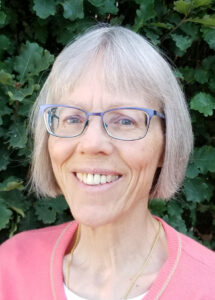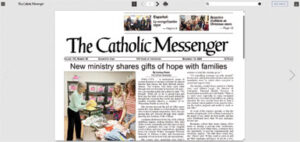By Barb Arland-Fye
Editor

Around mid-March each year, I anticipate a text message from Kathy to set a date to celebrate my son Colin’s birthday. Kathy, a caregiver, met Colin when she worked for an agency that provided services to him. He made his way into her heart and long after she moved on to a nursing career she arranged an annual get-together to treat Colin to dinner and a visit to the bookstore around his birthday.
We won’t receive a text message this year. Kathy, 69, died earlier this month. Colin, who lives with autism, reacted to the news with sadness. Kathy wasn’t the first of his beloved caregivers to die but my husband Steve and I haven’t figured out how Colin internalizes these losses. That night in prayer, Colin substituted his petition for an end to the war in Gaza and Ukraine with a petition for the soul of Kathy.
Three years ago in early March, Colin lost another beloved former caregiver, Josh, who was only 41 when he died unexpectedly, leaving behind his wife and three young children. Josh “lived a life of immense love and compassion,” his obit read. “He was committed to social justice and serving marginalized populations throughout his life. He dedicated himself to serving individuals with disabilities.”
Colin was a teenager when Josh began working with him and they connected immediately. Colin’s eyes lit up and he rocked with excitement in anticipation of Josh’s arrival for an outing. Like Kathy, Josh moved on to other employment but kept in touch occasionally while juggling family and career responsibilities. Colin’s memories of Josh are indelible.
A third beloved caregiver, Ramona, also died unexpectedly at age 50 in 2018. Both she and Josh began as caregivers with the agency that provides services to Colin and then moved to supervisor positions that provided plenty of opportunities to work with our son and us. Her obituary described Ramona as someone “always taking care of everyone else first.” She cared deeply about Colin and he thrived in her care.
His former caregivers and current caregivers who are his companions on the journey now — Amanda, Ashley, Aaron and Rebecca, among them — came to mind as I read the Gospel reading (Matthew 25: 31-46) for the first Monday of Lent.
“…Then the righteous will answer him and say, ‘Lord, when did we see you hungry and feed you, or thirsty and give you drink? When did we see you a stranger and welcome you, or naked and clothe you? When did we see you ill or in prison, and visit you?’ And the king will say to them in reply, ‘Amen, I say to you, whatever you did for one of these least brothers of mine, you did for me.’”
The caregivers who passed away were saints in our midst, living Matthew 25:31-46 whether or not they realized it. Their successors are doing the same. “When we deal with each other, we should do so with the sense of awe that arises in the presence of something holy and sacred. For that is what human beings are: we are created in the image of God, the U.S. Conference of Catholic Bishops said in their pastoral letter, “Economic Justice for All” (no. 28).
This Lent, I hope to follow the example of these beloved caregivers, interacting with the least among us “with a sense of awe that arises in the presence of something holy and sacred.”
(Contact Barb Arland-Fye at arland-fye@davenportdiocese.org)









